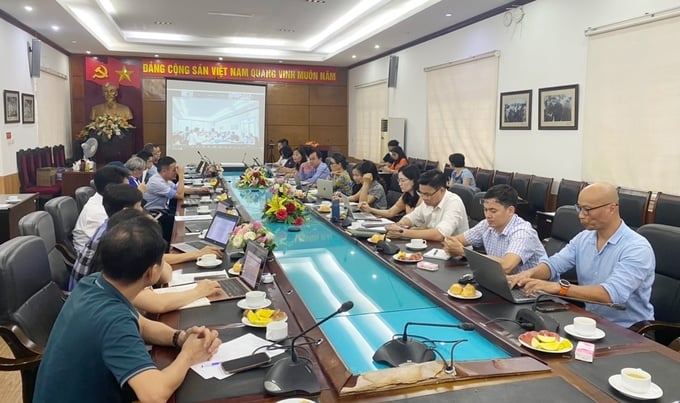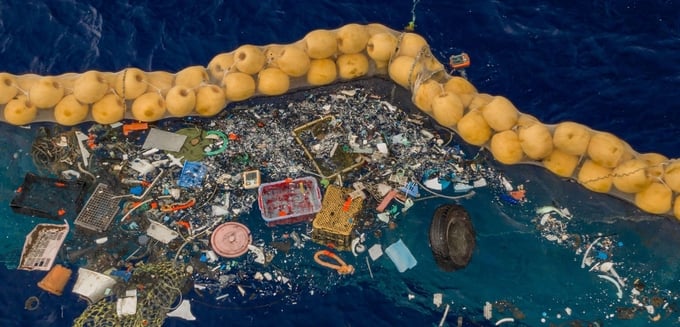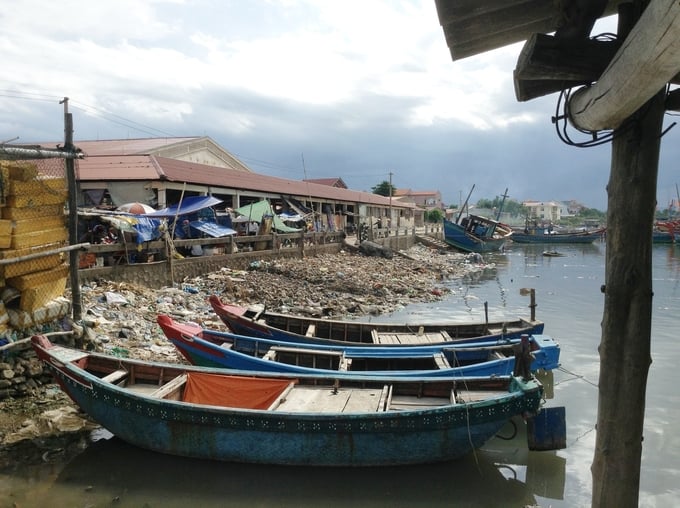May 30, 2025 | 15:03 GMT +7
May 30, 2025 | 15:03 GMT +7
Hotline: 0913.378.918
May 30, 2025 | 15:03 GMT +7
Hotline: 0913.378.918

The Directorate of Fisheries (MARD) organized the "Annual Forum on Ocean Plastic Waste in the Fisheries Sector in 2024" on the afternoon of April 2 in Hanoi, in collaboration with the Ocean Plastic Reduction Project in Vietnam and the World Wide Fund for Nature in Vietnam (WWF Vietnam). Photo: Hong Tham.
The Directorate of Fisheries (MARD) organized the "Annual Forum on Ocean Plastic Waste in the Fisheries Sector in 2024" on the afternoon of April 2 in Hanoi, in collaboration with the Ocean Plastic Reduction Project in Vietnam and the World Wide Fund for Nature in Vietnam (WWF Vietnam), as part of the celebrations commemorating the 65th anniversary of the traditional day of the fisheries sector (1959-2024).
During his inaugural address at the Forum, Mr. Tran Dinh Luan, Directorate of Fisheries, made the following statement: "It is widely acknowledged that the Vietnamese fisheries sector, in addition to its notable accomplishments in production, export, and domestic supply, is confronted with a multitude of environmental challenges. Presently, plastic waste in the ocean is a critical environmental concern in Vietnam; therefore, the fisheries industry has been and continues to implement management strategies that mitigate the environmental impacts of plastic jointly.
Vietnam, similar to numerous nations globally, is resolute in its efforts to combat plastic contamination and ocean plastic waste to a significant degree. We anticipate that all sectors, not just the fishing industry, will develop strategies to reduce plastic waste. Director Tran Dinh Luan stated that the Forum anticipates hearing about innovative approaches, effective solutions, and best practices to enhance the management of plastic pollution in fisheries activities in the near future.
According to Ms. Nguyen Thi Phuong Dung, Head of the Department of Science, Technology, and International Cooperation (Directorate of Fisheries), the "Action Plan for Managing Ocean Plastic Waste in the Fisheries Sector, 2020- 2030," which was approved by the MARD, has the following objectives: reduce plastic waste in fisheries production, manage ocean plastic waste gradually from its source to the ocean, advance circular economy and green economic development, and enhance public awareness and social responsibility regarding ocean plastic waste.
The specific objectives for the period 2021-2025 are to increase stakeholder awareness regarding the reduction of plastic materials in the fishing industry. Minimize the use of disposable plastic apparatus and materials. Enhance the efforts to gather, categorize, repurpose, and manage plastic waste originating from fisheries production attempts. Coordinate the collection, classification, and transfer of plastic waste from marine protected areas to processing units following a monitoring strategy. Construct a database of marine plastic waste in the fishing industry.
The objective of the plan is to educate stakeholders between 2026 and 2030 regarding the significance of reducing plastic pollution in the fishing industry. Minimize the utilization of disposable plastic apparatus and materials. Enhance the efforts to gather, categorize, reuse, and manage plastic waste originating from fisheries production endeavors. Enhance the database pertaining to plastic waste in the ocean as it relates to the fishing industry.In addition, the decision outlines five primary tasks and solutions, which include altering the habits of fishermen and related parties, fostering responsibility, and increasing awareness. Establishing and enhancing state management documents pertaining to the fisheries sector's management of ocean plastic refuse. The fisheries sector should strive to reduce plastic pollution by means of collecting, sorting, reusing, recycling, and a gradual substitution of single-use plastic materials. Technological research, application, development, and transfer within the fisheries industry with respect to the management of ocean plastic refuse. "As well as enhancing global collaboration," Ms. Dung stated.
In recent times, there has been a notable increase in the collaboration between local governments, domestic and international organizations, and the fisheries sector to reduce plastic debris in the ocean.
Department of Agriculture and Rural Development of Binh Dinh province representatives stated that a pilot program is currently being developed to collect household plastic debris from fishing vessels and transport it to the Quy Nhon fishing port. The pilot initiative presently encompasses an estimated 100 fishing vessels and is scheduled to be extended to an additional 100 vessels at the Quy Nhon fishing port between November 2023 and November 2024.
Additionally, the province of Binh Dinh has issued Decision No. 89 regarding the administration and control of plastic waste aboard fishing vessels. As a consequence, the province is a leader in the management of plastic debris resulting from fishing operations. A fishing vessel of 15 meters or greater is obligated to comply with this regulation at the Quy Nhon, De Gi, and Tam Quan fishing ports by gathering and disclosing plastic waste generated during each fishing expedition. It is recommended that fishing vessels measuring between 12 and 15 meters in length adhere to these regulations.

Plastic waste is a significant and increasing issue for the marine environment. Photo: Alamy Stock.
The Director of the Plastic Reduction Program at the World Wide Fund for Nature in Vietnam (WWF-Vietnam), Ms. Nguyen Thi Dieu Thuy, described the organization's recent endeavors to reduce plastic waste in the ocean. As an illustration, WWF-Vietnam provided assistance to three Marine Protected Areas/National Parks (Phu Quoc, Con Dao, and Cu Lao Cham) between 2019 and 2023 in the execution of initiatives aimed at monitoring and evaluating plastic pollution along the coastlines and coral reefs of eleven Marine Protected Areas across the country.
Furthermore, WWF-Vietnam has carried out various models to address the issue of marine plastic waste at the local level. These include the anti-ocean plastic waste fishing fleet model implemented in Phu Quoc, the pilot model for plastic waste management for fishing vessels and ports in Da Nang that adheres to Annex V of the Marpol Convention, and the fishermen collecting waste ashore model in Dong Hoi (Quang Binh).
As per statements made by An Thoi Fishing Port representatives (Phu Quoc, Kien Giang), the port consistently provides residents engaged in port-area activities with information that promotes cleanliness, encourages appropriate waste disposal, and mobilizes shipowners and captains to instruct crew members to gather and sort waste on board and return it to land following each fishing expedition.
In the coming time, An Thoi Fishing Port will persist in its efforts to coordinate, distribute knowledge, and offer direction to entities and individuals engaged in waste sorting and disposal endeavors in the port vicinity. Particularly, it will concentrate on encouraging captains and shipowners of participating vessels to sign commitments, exhibit posters on board, and instruct crew members to conscientiously gather and sort all waste produced on board into bags supplied by the An Thoi Port Border Station. Furthermore, they will offer instructions regarding the appropriate handling and disposal of refuse after its arrival on land.

In Vietnam, the estimated amount of plastic waste entering the ocean annually ranges from 0.28 to 0.73 million tons. Photo: Hong Tham.
WWF-Vietnam's strategic objectives for the period 2024-2025 were as follows: establishing experimental models to collect plastic waste from fishing vessels at An Thoi Fishing Port in a cost-effective manner; maintaining support for WWF-local initiatives of plastic waste; fostering collaboration and knowledge exchange regarding initiatives and experiences concerning the management and reduction of plastic waste in coastal regions via diverse communication channels, educational programs, workshops, and field visits; and integrating plastic waste reduction efforts.
A long-term communication initiative for plastic waste reduction activities, particularly in Marine Protected Areas, is in place at the Directorate of Fisheries. Governmental and local authorities are formulating policies to facilitate the transition to environmentally sustainable materials in the fisheries sector.
According to the National Coordinator of the Small Grants Program, Global Environment Facility, United Nations Development Program (UNDP) Nguyen Thi Thu Huyen, the current challenges associated with waste management and plastic waste are disjointed, lacking scientific rigor, inadequately resourced, disconnected, and devoid of community engagement... Multiple stakeholders must be mobilized and linked to manage waste at its source and along its path, etc.
Translated by Linh Linh

(VAN) Ms. Nguyen Thi Dung, Deputy Director of Ngoc Hoang Cooperative, shared about the journey of bringing dragon fruit to Europe, achieving annual revenues in the billions of VND.

(VAN) Bamboo products from Thang Tho Bamboo Cooperative have reached many countries around the world, while also creating jobs for local workers.

(VAN) The Management Board of Con Dao National Park reported that a green sea turtle, tagged in the Philippines, has traveled thousands of kilometers to lay 84 eggs on Bay Canh Islet.

(VAN) Green technology is paving a new path for sustainable aquaculture in the Mekong Delta in particular and across the country in general, helping reduce emissions and adapt to climate change.

(VAN) On May 27, La French Tech Vietnam (the French startup and innovation community in Vietnam) held the French Tech Summit Vietnam 2025.
/2025/05/27/4731-2-223159_980.jpg)
(VAN) No votive paper, no styrofoam, no plastic bags, no plastic bottles, and no single-use plastic trays are the key rules tourists should keep in mind when visiting Con Dao.

(VAN) In the fight against plastic pollution, Vietnam has been demonstrating a proactive, pioneering, and active role in addressing the greatest environmental challenge today.